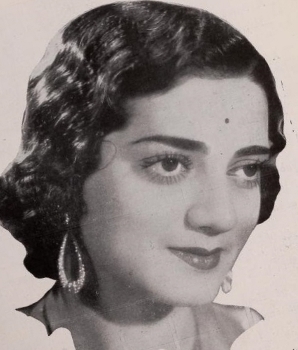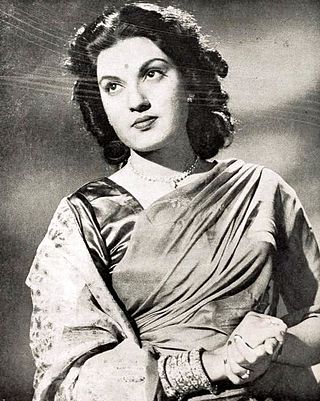Related Research Articles
Gul Hamid (1905-1936) was an Indian actor. He started his acting career in silent films and later played leading roles in talkies. He had many honors to his credit. He acted in Heer Ranjha, the first film produced in Punjabi and in Seeta, a talkie that won an honorary diploma in the 1934 Venice Film Festival and that was also the first Indian film shown at an International film festival. Hamid also wrote the script, acted in, and directed the film Khyber Pass (1936). Hamid died of Hodgkin's Disease in 1936.

Abdur Rashid Kardar was an Indian film actor, director and producer. He is credited with establishing the film industry in the Bhati Gate locality of Lahore, British India.
Nai Duniya is a 1942 Bollywood film directed by Abdul Rashid Kardar and starring P. Jairaj, Shobhana Samarth, and Mazhar Khan.

Alibaba And 40 Thieves is a 1954 Hindi fantasy action film directed by Homi Wadia. The film was a Basant pictures presentation under the Wadia Brothers Production banner. The story, screenplay and additional dialogue were by J. B. H. Wadia, while the dialogues were written by Chand Pandit and Tahir Lucknavi. The art direction and special effects were by Babubhai Mistry. The music was composed by Chitragupta and S. N. Tripathi. Chitragupta had worked as an assistant to S. N. Tripathi in some of the mythology and fantasy films before branching out on his own. The lyricist was Raja Mehdi Ali Khan. It stars Mahipal, Shakila in the lead roles, with S. N. Tripathi, B. M. Vyas, Sharda, Lalita Kumari and Helen.
Aap Ki Marzi is 1939 Hindi romantic comedy film directed by Sarvottam Badami. The film was produced under the Sudama Productions banner. The music composer was Gyan Dutt with lyrics credited to Pyare Lal Santoshi and S. P. Kalla. It starred Motilal, Sabita Devi, Khursheed, K. N. Singh, Mazhar Khan, Vasanti and Sunalini Devi. This was director Badami's second comedy film; he had earlier directed the comedy Teen Sau Din Ke Baad (1938) which turned out be a box office success. Aap Ki Marzi was based on the MGM produced, Edward Buzzell directed film Paradise for Three (1938), itself adapted from Erich Kästner's novel Three Men in the Snow.

Mehtab (1913–1997) was an Indian actress of Hindi/Urdu films who worked from 1928 to 1969. She was born in Sachin, Gujarat, to a Muslim family and named Najma. Her father, Nawab Sidi Ibrahim Mohammad Yakut Khan III, was the Nawab of Sachin, near Surat in the state of Gujarat. Starting her career in the late 1920s with small roles in films like Second Wife (1928), Indira B. A. (1929) and Jayant (1929), she went on to do character roles before acting in the lead opposite Ashraf Khan in Veer Kunal (1932). After almost a decade of doing mainly action-oriented roles, she came into prominence with the Kidar Sharma-directed Chitralekha (1941).
Sarfarosh also called Brave Hearts was a 1930 Indian silent film directed by A. R. Kardar. Made as action adventure film based on the RKO dramas, it was produced by Kardar's production company, "Playart Phototone". According to Hameeduddin Mahmood, the films had double titles up until the mid-1930s; the Hindi/Urdu name for the home market (India), and the English name for the overseas market. Kardar gave up acting after having starred in Husn Ka Daku (1929) and cast Gul Hamid in the main role. He also gave Rafiqe Ghaznavi a break as an actor in the film. Ghaznavi went on to become a famous music director.
Safdar Jung is a 1930 action costume silent film directed by A. R. Kardar. The film was the third to be produced by Kardar's United Players Pictures, following Husn Ka Daku (1929) and Sarfarosh (1930).

Aurat Ka Pyar is a 1933 Indian film directed by A. R. Kardar. The film was produced by the East India Film Company, in Calcutta. Kardar had moved from Lahore to Calcutta where he directed several films for the company from 1933–36, including Aurat Ka Pyar. The music composer was Mushtaq Ahmed and lyrics were by Agha Hashar Kashmiri, who also scripted the film. It starred Gul Hamid, Mukhtar Begum, Mazhar Khan, Anwari Bai, Bacha, Abdul Sattar and Athar.

Baghban (transl. Gardener) is a 1938 Indian family drama film directed by A. R. Kardar.
Chandragupta is a 1934 Hindi/Urdu historical film directed by A. R. Kardar. Produced by East India Film Company, the music direction was by K. C. Dey. Kardar had shifted to Calcutta where he joined the East India Film Company, and directed "hits" like Chandragupta. The film starred Nazir as Chandragupta. The cast included Gul Hamid, Sabita Devi, Mazhar Khan, Dhiraj Bhattacharya, Vasantrao Pehalwan.
Sultana is a 1934 Hindi/Urdu film directed by A. R. Kardar. The film was produced under the East India Film Company banner. The music director was Mushtaq Ahmed, who also played a small role in the film. The lyrics were written by Munshi Aziz. The cast included Gul Hamid, Zarina, Mazhar Khan, Nazir, Indubala, Nawab and Athar.

Milap (transl. the union is a 1937 Indian social drama film directed by A. R. Kardar. Produced under the Moti Mahal Pictures banner, it had music composed by K. C. Dey. Milap was a big success for the actress Rampyari.
Farebi Shahzada also called The Shepherd, is a 1931 Indian cinema's action silent film directed by A. R. Kardar. The film was also known as Gudaria Sultan or The Shepherd King and was the fourth of seven films Kardar produced under Kardar's United Players Corporation, Lahore.
Khooni Katar also called Golden Dagger is a 1931 Indian cinema's action adventure silent film directed by A. R. Kardar. The film was also called Sunheri Khanjar and the fifth film to be produced by Kardar for his United Pictures Corporation. The film is famous for the debut of the actor-producer-director Nazir.
Farebi Daku also called Mysterious Bandit is a 1931 action silent film produced and directed by A. R. Kardar. Kardar set up his own production company "United Players Corporation" in 1928 and in quick succession produced and directed seven pictures, Husn Ka Daku (1929), Safdar Jung (1930), Sarfarosh (1930), Farebi Shahzada (1931), Khooni Katar (1931), Farebi Daku and The Wandering Dancer or Awara Raqasa. Awara Raqasa was the only film out of the seven produced by Kardar, which was directed by J. K. Nanda, who had received his direction and cinematography training in Germany.

Sabita Devi (1914–1965) was a Hindi film actress in Indian cinema. She is stated to be one of the "prominent" leading ladies of the "pioneering era" of Indian cinema along with Mehtab, Bibbo, Durga Khote, Gohar, Devika Rani and Seeta Devi. A Jewish by birth, she changed her name to find acceptability in Hindi cinema like the other Anglo-Indian and Jewish actresses of her time, Sulochana, Seeta Devi, Madhuri, and Manorama. After initially working with British Dominion Films Ltd., Calcutta, she shifted to Bombay and performed mainly in films produced by Sagar Movietone with her co-star in most films being Motilal. Some of the popular films with Motilal were Dr. Madhurika (1935) and Kulvadhu (1937) directed by Sarvottam Badami. Their first film together was Shaher Ka Jadoo (1934), which was also Motilal's debut film, and then Lagna Bandhan (1936) both directed by Kaliprasad Ghosh. She acted in Silver King (1935) with Motilal. It was an action film directed by C. M. Luhar, which became a "huge success".

Munawar Sultana was an Indian cinema actress, who acted in Hindi films. She is cited as one of the "popular" actresses of the late 1940s to early 1950s period, along with Noor Jehan, Swarnalata and Ragini. Her specialty was playing a selfless woman, enduring the rough treatment meted by her husband and family, but who eventually "brought her erring husband back home".

Mazhar Khan was an actor, producer, and director in Indian Cinema. He began his career as a police officer, which he left to study law for a short period. After abandoning his studies, he came to Bombay and started his career in cinema with the silent film Fatal Garland (1928) opposite the top actress of the time, Ermeline. He became a popular actor, gaining success in several silent films. During his stint in silent films he worked with directors such as Bhagwati Prasad Mishra, Ezra Mir, Moti P. Bhagnani, R. S. Chowdhary, and M. D. Bhavnani. Magazines in the 1940s compared Khan to Hollywood actors such as Paul Muni, Bela Lugosi and Boris Karloff.
Baghi Sipahi may refer to:
References
- ↑ Ashish Rajadhyaksha; Paul Willemen; Professor of Critical Studies Paul Willemen. Encyclopedia of Indian Cinema. Routledge. pp. 81 and 122. ISBN 978-1-135-94318-9.
- ↑ Yves Thoraval (1 February 2000). The cinemas of India. Macmillan India. ISBN 978-0-333-93410-4.
- 1 2 3 4 5 6 7 8 "Baghi Sipahi". Complete Index To World Film (CITWF) website. Alan Goble. Archived from the original on 2 April 2015. Retrieved 2 November 2022.
- ↑ Ashok Raj (1 November 2009). Hero Vol.1. Hay House, Inc. pp. 52–. ISBN 978-93-81398-02-9.
- ↑ Bhagwan Das Garga (1996). So many cinemas: the motion picture in India. Eminence Designs. ISBN 978-81-900602-1-9.
- ↑ T. M. Ramachandran; S. Rukmini (1 January 1985). 70 Years of Indian Cinema, 1913-1983. CINEMA India-International. ISBN 978-0-86132-090-5.
- ↑ "Baghi Sipahi". Muvyz.com website. Retrieved 2 November 2022.